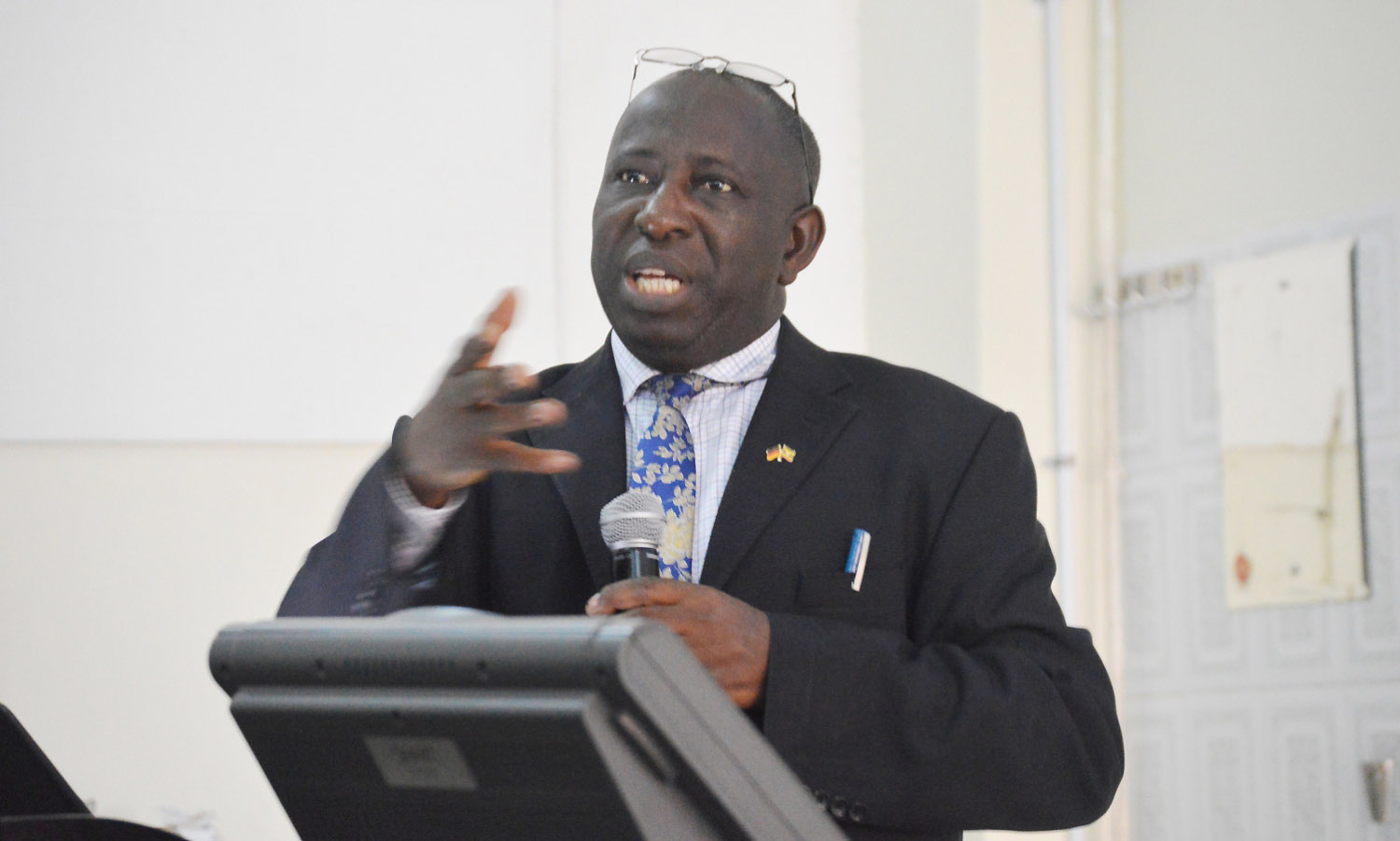Moringa oleifera also dubbed the superfood of superfoods or ‘Miracle’ tree is the most widely cultivated species of the Moringa genus of trees with its origins in South Asia. In Uganda, Moringa oleifera leaves are widely consumed by communities, mostly for their nutritional and medicinal values. Its use continues to multiply rapidly with countless products made from the tree’s leaves and roots lining supermarket and pharmacy shelves. It has however been noted that the use of Moringa oleifera is not well standardised.
It was against this background that the Makerere University College of Health Sciences (MakCHS), School of Biomedical Sciences organised “The Day of Moringa Science” at which studies done on Moringa oleifera leaves were disseminated to the Ministry of Health, researchers, academicians, ethno botanists, policy makers, herbalists and students. Held in the Davies Lecture Theatre, MakCHS, on Tuesday, 9th July 2019, the activity was supported by the Directorate of Research and Graduate Training (DRGT) under the two year (2017-2019) Nurturing Emerging Research Leaders through Post-Doctoral Training at Makerere University (NERLP) project funded by the Carnegie Corporation of New York.
Welcoming participants, the Principal MakCHS, Prof. Charles Ibingira noted that outcomes of the Day of Moringa Science would mark a turning point in the use of traditional medicinal plants in Uganda to discover drugs that treat chronic illnesses and combat drug resistant micro-organisms.

“I commend Prof. Josephine Kasolo and the Department of Physiology for conducting research on the medicinal values of Moringa oleifera. It is this research that will help us better understand and modernise what herbalists have been practicing over the decades” remarked the Principal.
He also thanked Prof. Kasolo championing efforts at MakCHS to better brand and package Moringa oleifera and challenged the student community present to take advantage of the renewed interest in herbal remedies to add value to medicinal plants. Herbal remedies, he noted, were the next big thing and those who invested now would reap financial benefits in the future.
Representing the Ministry of Health, the Commissioner Clinical Services, Dr. Jackson Amone congratulated MakCHS and the Department of Physiology in particular for dedicating an entire day to Moringa Science. He paid tribute to his former Lecturer, Prof. Josephine Kasolo for working hard to bridge the gap between traditional and modern practices of medicine.
“When I visited China over ten years ago, we were taken to a Traditional Chinese Medicine Hospital where patients were given an assortment of herbs packed in numerous polythene bags as their prescription. Our recent visits to the same facilities showed that our colleagues through the use of modern technology have managed to pack the same prescriptions better in tablets, capsules and many other forms. I am therefore happy that we are also following the same trend with the products on display here” remarked Dr. Amone.

One of the products on display was REPLENISH+; an all-natural immune booster made up of SelenoExcell Selenium and Moringa oleifera, produced by a Ugandan company – Doctor’s Choice Limited.
Addressing the participants, Prof. Josephine Kasolo thanked all present for sparing time to attend the 2019 Day of Moringa Science. She noted that Moringa was indeed a ‘Miracle’ tree with both medicinal and nutritional uses.
“Moringa oleifera contains multivitamins, amino acids, antioxidants and has been proven to grow well in loam, sandy and clay soils as well as murram. This means that it can be grown in any part of Uganda” added Prof. Kasolo.
She further shared that Moringa oleifera was massively promoted by the local media in the 1980s as a plant able to cure the symptoms of HIV/AIDS and the leaves continue to be widely used by herbalists for their medicinal properties.

“The Department of Physiology has identified a number of phytochemicals from Moringa oleifera leaves and established twenty four medicinal uses. We are in the process of developing our own product and thank Doctor’s Choice for coming to share with us what they have done so far” remarked Prof. Kasolo.
The presentation on REPLENISH+ by Doctor’s Choice showed that research on subjects who took daily doses of 200µg of Seleno Excell Selenium had 63% fewer cases of prostate cancer, 58% fewer cases of colon or rectal cancers, and 46% fewer cases of lung cancers than those not receiving the supplement. The same research showed a 50% reduction in cancer mortality and 37% reduction in cancer incidence.
The presentation also highlighted that our bodies use selenium along with tryptophan, cysteine and glutamine that are found in Moringa oleifera to produce an enzyme called Glutathione Peroxidase. This important enzyme serves as a natural antioxidant and boosts the immune system.
A second presentation by Mr. Kenneth Mugume, Programs Officer (Research and Development) at THETA Uganda showcased additional herbal formulations of Moringa oleifera such as Booster Plus; by Kampala Pharmaceutical Industries (KPI) and Revital; by Aloesha Organic. He also shared publications showing that the Moringa plant alkaloid moringine relaxes the bronchioles and as such can be used for the treatment of asthma.

Mr. Mugume further highlighted that organic Moringa contains 46 anti-oxidants, 36 anti-inflammatories, 18 amino acids, 9 essential amino acids and 92 nutrients. In terms of nutritional value, Moringa contains double the protein in yoghurt, triple the potassium in bananas, four times the calcium in milk, four times the vitamin A in carrots, seven times the vitamin C in oranges among other nutrients.
Regular consumption of organic Moringa, he shared, has additional benefits such as stimulating hair growth, normalising blood sugar, normalising blood pressure, curing Urinary Tract Infections (UTIs), enhancing skin health, increasing energy and endurance and increasing mental clarity. Other benefits included; improving wound healing, reducing wrinkles, improving digestion, eliminating constipation, detoxifying the body and improving nutrition for infants six months and older as well as pregnant or nursing mothers among others.
Article by Public Relations Office

 General2 weeks ago
General2 weeks ago
 Natural Sciences2 weeks ago
Natural Sciences2 weeks ago
 Agriculture & Environment1 week ago
Agriculture & Environment1 week ago
 Health2 weeks ago
Health2 weeks ago
 General5 days ago
General5 days ago







